Sharp drop in German emissions sign of Energiewende turnaround - think-tank
Carbon emissions in Germany rose in 2012 and 2013 despite record levels of renewable energy production, in what the Agora Energiewende dubbed the “Energiewende paradox”. That led many observers to wonder whether the big push into renewable energy was still serving its long-term goal - to help mitigate climate change.
But in 2014, CO2 emissions fell by 30 million tonnes, with a minus of 16 million tonnes originating from the power sector, the think-tank found. Emissions in 2014 were at their lowest since 1990. Only in 2009, the year of the economic crisis, did Germany emit less CO2. (See Figure 1 and Agora Energiewende presentation in English).
“The former Energiewende paradox shows signs of resolving itself,” Patrick Graichen, Director of the Agora Energiewende, told the Clean Energy Wire.
More power production from fossil fuels was largely responsible for the increase in greenhouse gas emissions between 2009 and 2013 with the amount of power generated from lignite reaching its highest level since 1990 in 2013. Breaking that trend was at the heart of the German government’s policy initiative in December 2014. A Climate Action Programme was adopted to make sure that greenhouse gas emissions will be reduced by 40 percent in 2020 compared to 1990, according to the country's self-imposed target.
Now, in 2014, renewables for the first time contributed more to the power mix than electricity from lignite and covered 27.3 percent of the national electricity consumption and 25.6 of gross electricity production (Figure 2).
The rise in renewables primarily led to a reduction in power production from hard coal, the Agora’s analysis found. As renewable power (and lignite) have pushed natural gas out of the market in recent years, competition from renewables now more and more affect old, hard coal-fired power plants, Patrick Graichen explained. “However, there remains a strong lignite base,” he added. Aaction aimed at shutting down lignite power plants should be taken in conjunction with regulations for a new power market which the government is going to decide on in spring 2015, he said.
Reasons for falling emissions
An important reason for falling emissions – and the biggest surprise when looking at the 2014 power data, according to the Agora Energiewende – is the 3.8 percent decrease in power consumption. Germans used 23 terrawatt-hours less electricity compared to 2013, a fall rivalled only by the 6-percent-slump in the economic crisis year of 2009. Primary energy consumption, including all energy (electricity, heating, fuel) used by households, industry and the transport sector also fell to its lowest level since 1990, according to the AG Energiebilanzen in December 2014.
The reasons why Germans are using less energy are hard to pin down, Patrick Graichen admitted. One definite and important cause was the mild winter of 2014, which largely affected primary energy consumption since this includes energy for heating. But electricity consumption was also reduced by warm temperatures – 2014 was the warmest year in Germany on record. “Increased efficiency in the industry sector could be another reason as well as less energy consumption in households, where more and more LED lamps are installed. There is probably not one major reason but rather many small efficiency achievements,” Graichen said.
The economic growth and power consumption decouple
While power consumption decreased, the German economy was seen growing by 1.4 percent in 2014, the Agora said. Since 1990, the country’s gross domestic product grew by 40 percent, meanwhile power consumption only rose by 5 percent. “This shows as a long-term development that economic growth and power usage are decoupled,” Agora concludes.
Prices
Power prices at the electricity exchange (spot market) came to only 33 euros per megawatt-hour, the Agora report showed, naming cheaper coal and gas and the growth of renewables as a competition for conventional energies as reasons for the development. As this trend continues and the surcharge for renewables included in the power price is due to fall as well, the think-tank predicts slightly decreasing power prices for both companies and households in 2015. “Particularly energy intensive industry which can buy power wholesale will profit from this trend,” Patrick Graichen said.
* The Agora Energiewende and the Clean Energy Wire are both joint initiatives of the Stiftung Mercator and the European Climate Foundation.



